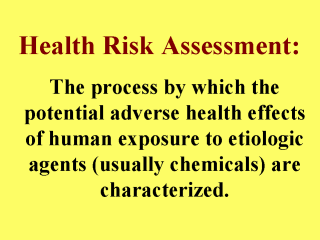 |
Health risk
assessment, or herein risk assessment (RA) for short, is the process or function by which
the potential adverse health effects of human exposure to etiologic agents are
characterized and assessed. Insofar as social choice has a great impact on PH and on its
administrative structures or contexts, the process of performing RA is likewise bound by
social values and regulations. The case studies presented in the classic book Acceptable
Risk? by Lee Clarke (1989) clearly illustrate this point. As stressed by its author,
“The premise of this book is that organizations are central actors in assessing,
mitigating, and accepting risks.” To gain a better understanding of how RA can be
influenced by social values or public concerns, students are referred to the landmark book
Silent Spring by the well-known environmentalist Rachel Carson (1962). U.S. Vice
President Al Gore recently introduced both this landmark book and the author, on the White
House Office of Vice President’s 24 Hours in Cyberspace, by saying that “The
Environmental Protection Agency was established in 1970, in large part because of the
concerns and the consciousness that Rachel Carlson had raised [in her book].” |
